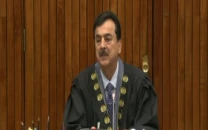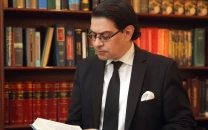'Bail dismissal to be followed by arrest'
.

The Supreme Court has directed police authorities to immediately arrest accused persons once their pre-arrest bail petitions are dismissed, stressing that law enforcement agencies cannot delay action in anticipation of further instructions or stay orders that do not exist.
"This Court, therefore, finds it imperative to state clearly that investigating officers and police authorities are legally bound to act upon court orders dismissing pre-arrest bail immediately, without waiting for further instructions or presuming the existence of any stay where none has been granted," reads a four-page judgment authored by Chief Justice of Pakistan (CJP) Yahya Afridi.
The chief justice expressed concern over the inaction of investigative authorities in arresting suspects whose pre-arrest bails were dismissed by the high court six months ago.
"Administrative convenience, internal practice, or mere pendency of higher-forum proceedings cannot justify or excuse failure to act in accordance with law," the judgment added.
However, senior legal practitioners warn the order may have serious consequences for individual liberties.
Renowned lawyer Saif ul Malook argued that the right to approach the Supreme Court for pre-arrest bail has effectively been curtailed by the judgment. "So Articles 4, 9, 10, and 10A have practically been made redundant by this order," he said.
Another senior lawyer criticised the delay in the Supreme Court's own handling of such cases. "The SC should ask itself why the petition was pending for such a long time when the matter was regarding the liberty of a citizen," he said.
"This order will have serious implications for those who are innocent, particularly those targeted for political reasons," the lawyer added. "In many cases, the SC has overturned lower court or high court decisions and granted pre-arrest bail because a case was made out. But for whom is this order demeaning?"
The three-judge bench of the apex court, headed by CJP Afridi, noted in its order that the petitioners had remained at large for over six months, during which time no meaningful steps were taken by the police to secure their arrests.
"Such inaction on the part of the investigating authorities is a matter of serious concern. Prompt and faithful enforcement of judicial orders is fundamental to the criminal justice system. Once pre-arrest bail is declined by a competent court of law, the accused stands exposed to arrest in accordance with law," the judgment states.
The court also clarified that any practice where police treat the mere filing of a petition before the Supreme Court as an implied stay on arrest - despite the dismissal of pre-arrest bail - represents a fundamental misunderstanding of the purpose of pre-arrest bail.
"This relief exists as an exceptional measure to protect individuals against arbitrary or mala fide arrest, where circumstances clearly warrant such protection. Once a competent court has declined pre-arrest bail, it has necessarily determined that no such exceptional circumstances exist, and arrest is lawful and necessary to ensure an effective investigation."
The order added: "Allowing the mere act of filing another petition to operate as a de facto stay would render that judicial determination meaningless, defeat the objective of ensuring prompt and fair investigation, and risk abuse of process by enabling accused persons to indefinitely evade arrest without any legal basis. Therefore, judicial orders must remain binding and enforceable unless and until a competent court expressly orders otherwise."
"It must be remembered that interim protection is not automatic; it must be specifically sought and expressly granted. Absent such an order, a refusal of bail remains fully operative and must be implemented promptly and in good faith by investigating authorities."
The judgment also recorded that the Inspector General of Police, Punjab, appeared in person before the bench to explain the conduct of the investigating officers.
He unequivocally affirmed the legal position laid out by the court and confirmed that unless there is an express injunctive or restraining order from the SC, the mere pendency of a petition should not shield any accused from arrest.
When questioned about the delay and failure to execute the high court's order, the IGP submitted that a circular had been issued just a day before the hearing, directing all police officers to comply strictly with such orders and to carry out arrests without delay once pre-arrest bail is refused.
He further assured the court that the instructions would be renewed and reissued every six months to reinforce institutional discipline and awareness.
The SC observed that the practice of delaying or avoiding arrests on the pretext of a pending petition is deeply problematic as it undermines ongoing investigations and the authority of judicial decisions.
"In addition, such a practice risks promoting a culture of impunity, enabling accused persons to evade the process of law by exploiting systemic inaction. We find that such conduct cannot be sustained, as it runs counter to the ongoing efforts of the judicial and legal system to not only uphold the rule of law but also to inspire and maintain public confidence in it," the judgment concludes.
The court dismissed the pre-arrest bail petitions after the counsel for the petitioners did not press them.




















COMMENTS
Comments are moderated and generally will be posted if they are on-topic and not abusive.
For more information, please see our Comments FAQ